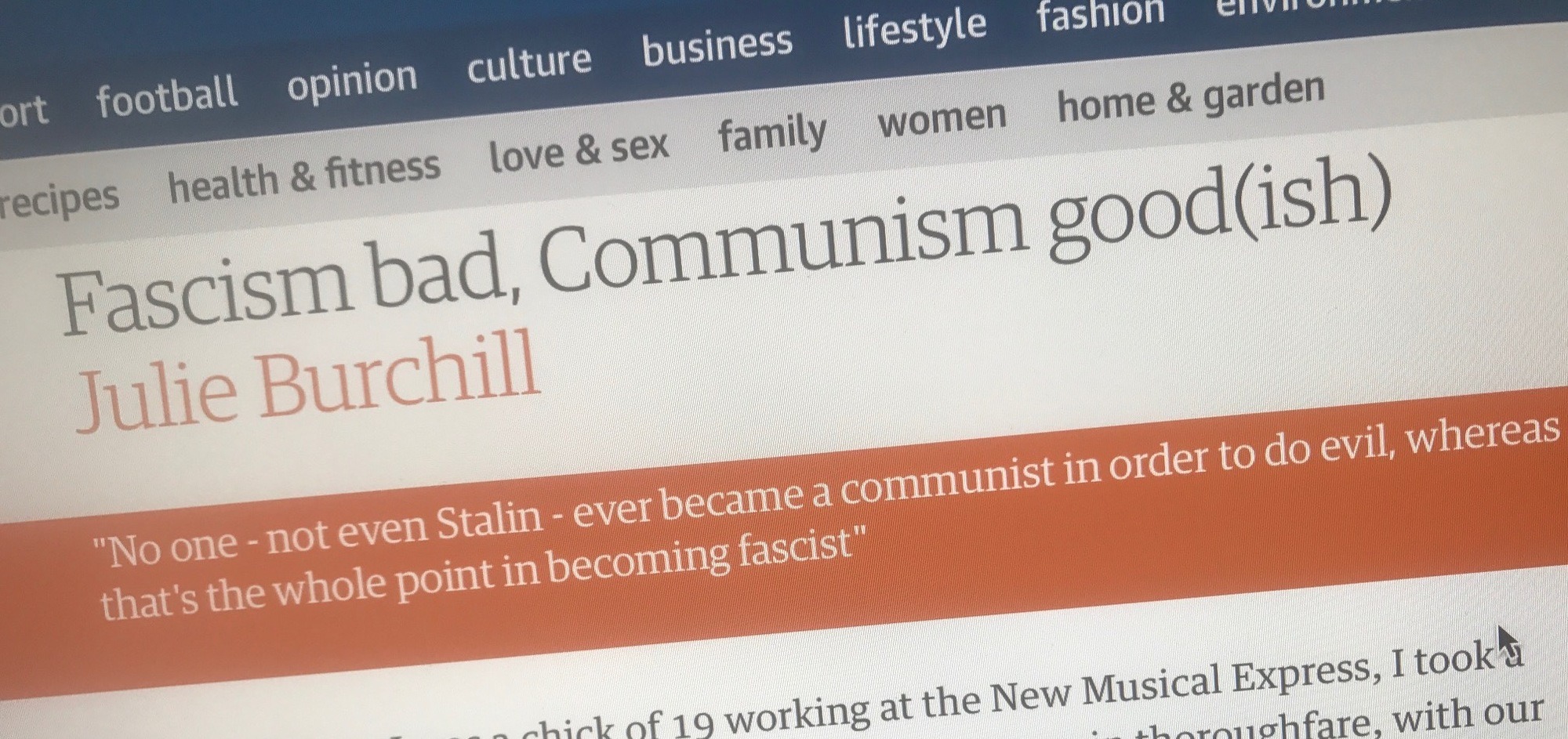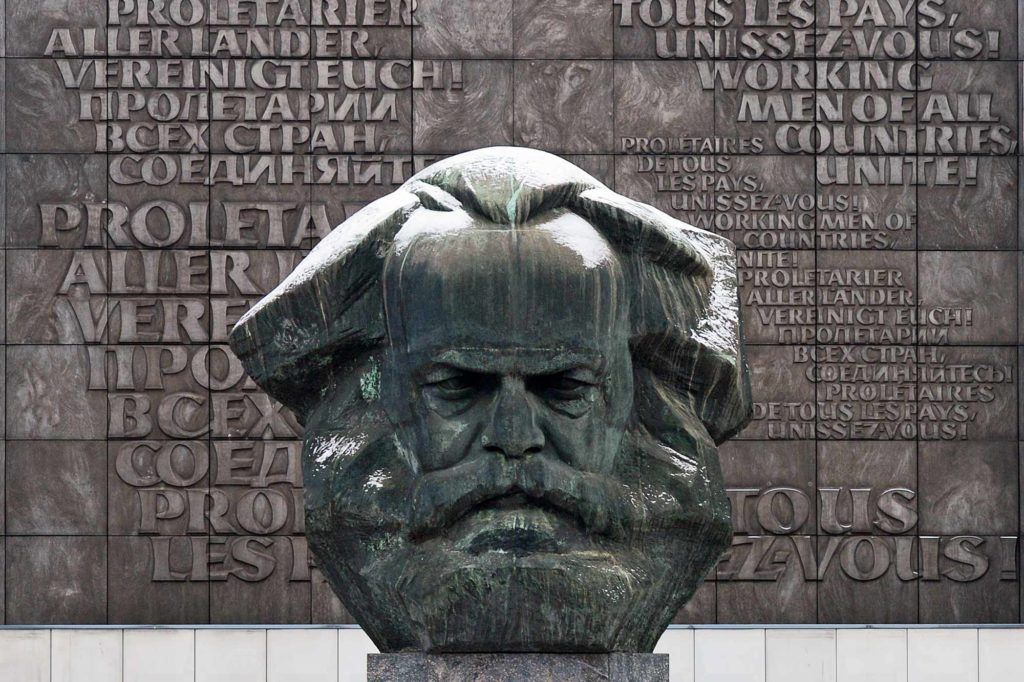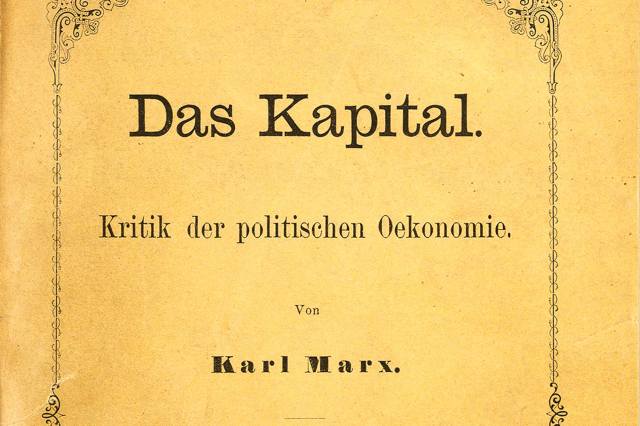Das Kapital was published 150 years ago this week – By Zentralbibliothek Zürich, via Wikimedia Commons

Marxian theory derives a certain respectability from its Hegelian origins, but how do we account for its ready – almost casual – advocacy of violence?
The first and principal volume of Das Kapital, Kritik der politischen Ökonomie (“Capital: A Critique of Political Economy”) was published in Hamburg a hundred and fifty years ago this week[1. The remaining volumes were edited by Friedrich Engels after Marx’s death (14 March 1883; buried at Highgate Cemetery in London).]. In it Marx observes that Die Gewalt ist der Geburtshelfer jeder alten Gesellschaft, die mit einer neuen schwanger geht – “Violence is the midwife of every old society pregnant with a new one”. Since then, violent midwifery in bringing forth the classless society of free labour and production has been prodigious. According to the grimly named website, Necrometrics.com, Stalin alone, directly or indirectly, probably killed thirty million people. This does not need comparison with fascism’s head count in order to accentuate its horror, for relativism only diminishes murder. The numbers speak for themselves – to which must be added those for China, South-East Asia, Africa and Latin America.
Yet as the former chief historian of the Foreign and Commonwealth Office, Gill Bennett, points out in her analysis of the ambivalence towards deaths in pursuit of communism (UnHerd):
“As the archives of former communist countries have become available since the end of the Cold War, it has become clear that however repressive those regimes may have been, many of their leaders continued to believe that they were building a better world. This idea of seeking to build a better world is key to understanding the different perceptions of the crimes committed by fascist, or communist regimes.”
Still getting away with murder

There is a fine example of this relativism in a Guardian piece by that entertaining but troubled journalist and author, Julie Burchill. Though written nearly twenty years ago, it sounds as if it was penned yesterday by a Corbynista:
“To put it brutally, communists may have killed more people than fascists, but we’re still not as bad. Communism commits evil when it goes wrong; fascism commits evil when all goes to plan. No one, not even Stalin, ever became a communist in order to do evil, whereas that’s the whole point in becoming a fascist[2. The Guardian of 30 October 1999, “Fascism bad, Communism good(ish)”].
Laying aside Burchill’s critique of fascism (which does not explain the rise of Hitler through the democratic process, or Mussolini’s popular appeal, or the Spanish Catholic hierarchy’s support of Franco), this idea of violence in communism being unfortunately consequential rather than fundamental is neither borne out by history nor by Marx’s writing. Burchill says communism kills only when it goes wrong. Wrong. Marx says it is necessary from the outset.
The language of violence
There is some ambiguity in language in Das Kapital which allows a certain convenient ambivalence towards the nature of violence. “Gewalt” is now usually translated as “violence”, especially in contemporary German, but in the first English edition (1887) it was translated as “force”. “Gewalt” connoted with power, authority, might – and still does: Befehlsgewalt, for example, is the authority to issue orders, used particularly in the military; Staatsgewalt is the power of the state to enforce its laws. Historically, Gewalt simply meant the ability to enforce one’s will against that of others, not specifically by physical violence. This pedantic reading can sanitise the business of enforcement. But Das Kapital’s historical examples (it is first a work of economic and social history) make clear that change cannot come without violence.

Marx was no mere dreamer
This should be no surprise when considering Marx’s own personal experience and the times he lived in. The image of the mild, bookish, hirsute scholar cloistered for years in the reading room of the British Library belies the fact that he was at heart a rowdy and a fighter.
Karl Heinrich Marx was born on 5 May 1818 in Trier in what had become, after the defeat of Napoleon, the Prussian Rhineland. In 1835 he began reading law and political economy at the university of Bonn, where he became an enthusiastic member of a “tavern club” given to boisterous drinking and revelling. As the son of a middle-class (and Jewish) lawyer, however, he soon attracted the unwelcome attention of the Borussia Korps, an aggressively Prussian military-social verband (association). As a result, young Karl began carrying a pistol, and fought at least one duel, in which he was slightly wounded above his left eye. The following year, at his father’s insistence, he moved to the university of Berlin, where he found the Prussianism even more disagreeable, but was evidently able to look after himself.
In 1843, just married, Marx moved to Paris. Eleven years earlier there had been a bloody republican uprising in the city, known today largely through Victor Hugo’s Les Misérables, and the atmosphere remained tense. Alexis de Tocqueville, speaking in the Chamber of Deputies in early 1848, said of it, “We are sleeping together in a volcano. … A wind of revolution blows, the storm is on the horizon.”
It was here that Marx met his great collaborator, Friedrich Engels, with whom in 1847 he co-authored Manifest der Kommunistischen Partei (The Communist Manifesto). And with the storm on the horizon, the Manifesto could hardly fail to catch the wind of revolution in all its ferocity. In chapter one Marx/Engels write: “the violent overthrow of the bourgeoisie lays the foundation for the sway of the proletariat.”
However, the risings of 1848 throughout Europe (but not Britain), inspired often by nationalism but with an admixture of radicalism, failed to deliver the triumph of the proletariat. In Paris the rising ended monarchy for good: Napoleon Bonaparte’s nephew was proclaimed “Emperor Napoleon III”, but things continued much as before. In Vienna, revolution was quashed with especial bloodshed, which only reinforced Marx’s belief in the necessity of violence. Indeed, he began to relish its prospect, writing in the Neue Rheinische Zeitung in November: “there is only one way in which the murderous death agonies of the old society and the bloody birth throes of the new society can be shortened, simplified and concentrated, and that way is revolutionary terror”, adding the ancient warning “Vae victis!” (Woe to the vanquished).
The following year, Marx moved to London, where he was to spend the rest of his life. For twenty years he laboured in the British Library, little-known except as leader of the International Working Men’s Association (“First International”) and to the marginalized European socialist intelligentsia. It was another clash of arms, in 1870 – the Franco-Prussian War and the Paris rising that came in its wake – that made him an international figure. On 1 September Napoleon III was surrounded and captured along with a large part of the French army at Sedan. The government in Paris fell, and with it the Second Empire, replaced by Le Gouvernement de la Défense Nationale. The “Third Republic” promptly made peace with Prussia at Versailles, but a radical commune was formed in Paris to continue the fight, aided by the Garde nationale. La Commune was put down after two months by the French army, during which 20,000 communards were killed.
Shortly afterwards, Marx hailed the Paris commune in a famous address, Civil War in France: “History has no comparable example of such greatness.… Its martyrs are enshrined forever in the great heart of the working class.” Engels thought it the first example in history of the “dictatorship of the proletariat.” They both attributed to La Commune more socialism than there had actually been, but the narrative served. From then on, Marx’s name was synonymous throughout Europe with the “revolutionary spirit” of the Paris Commune – and therefore with its physical violence. The lesson was clear: if only the communards had been able to apply more violence than the government, the rising would have been successful.

The ends justify the means
Herein lies the fatal flaw with Marxian theory. In Das Kapital Marx puts no limit on the amount of violence that may be required. His ethics are purely teleological (from the Greek telos, “end”) – the theory of morality rendered commonly as “the end justifies the means[3. As opposed to Emmanuel Kant’s (1724-1804) deontological ethic (from the Greek deon, “duty”), which holds that actions are morally right or wrong independent of the good or evil they achieve].” If the means are morally neutral, therefore, only to be judged in relation to the end they serve, what is the check on them? When the end appears (always) just beyond reach, the answer is ever more violence. But the end is never the end. Marx saw the enemy as essentially statist: the 1848 risings and the Paris commune were put down by the forces of the state. He failed to recognise the potential of popular counter-revolution. Communism being therefore in constant peril of counter-revolution, it needs constant “revolutionary terror” to deter it. Hence Stalin’s 30 million deaths.
Communism does not commit evil only when it goes wrong. As Daniel (Lord) Finkelstein wrote recently in The Times, true socialism always ends with the Stasi (secret police)[4. “True socialism always ends with the Stasi”, The Times from 30 August 2017].










Join the discussion
Join like minded readers that support our journalism by becoming a paid subscriber
To join the discussion in the comments, become a paid subscriber.
Join like minded readers that support our journalism, read unlimited articles and enjoy other subscriber-only benefits.
Subscribe